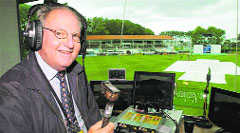
Tony Cozier was the voice of West Indian cricket for many years. AFP
Rohit Mahajan
The death of Tony Cozier, the great West Indian cricket writer and commentator, has silenced the voice of the West Indies cricket. Cozier's was a beautiful voice. It had a lovely lilt that made it very distinct from the other voices describing cricket in the 1960s, and even later. That voice, his deep love for cricket, his great knowledge about the sport and his repertoire of anecdotes made Tony Cozier probably the world's most- loved and respected cricket commentator and writer. As West Indies became a cricket superpower in the 1970s, Tony Cozier became the foremost and the best narrator of their story.
If you've read or heard about cricket — in newspapers, magazines, on radio, TV or the internet — you'd be familiar with his name. Cozier started writing in 1958 — in his father's newspaper in the West Indies — and covered cricket non-stop until his death. Illness and age impeded him over the last few years, but they didn't stop him — only death could do that.
He saw West Indies rise after 1975, and he saw West Indies fall after 1997. If you wanted an insight into West Indies cricket, you called Tony Cozier. Right until the end, he loved cricket, West Indian cricket in particular. The uninterrupted decline of West Indies over the last 25 years pained him, and he wrote and spoke passionately about it.
The outpouring of grief over the last 24 hours shows how much cricketers, journalists and fans loved him. Former England captain Michael Vaughan said: “Forget all the great players... Tony Cozier was the reason I loved West Indian cricket.” The great fast bowler Michael Holding suggested that Cozier was as good a writer/commentator as Gary Sobers was a cricketer.
“In the 1970s and 1980s when we did extremely well, he was the voice and was the eyes through which people saw our game,” said Clive Lloyd, the man who led West Indies to the top. “He was the voice they listened to, his was the pen which wrote of our exploits.”
Dale Steyn, the South African fast bowler, said: “His voice will echo in my mind forever!"
These are extraordinary things to say about a man who was merely a spectator and reporter — but these words are a measure of the respect he earned through his professionalism, passion for cricket and grace as a human being. Vaneisa Baksh, the Trinidad-based cricket writer, recalls that when she started in the male-dominated world of cricket journalism, she had many unpleasant experiences. But Cozier (and one more journalist) always treated her with respect and courtesy, and took what she wrote seriously.
In this era of T20 cricket, cricket and cricket writing have been transformed — now 10-ball and even five-ball innings are decisive and termed “great” and “fantastic”. This cricket is different — T20 is quite another sport altogether. West Indian cricketers are masters of this version, due to their strength and attitude. West Indies have won two T20 World Cup titles (2012 and 2016), but as Cozier noted with dismay, this success comes at the cost of West Indies in Test cricket. “There was the same euphoria and expectation after the men's World T20 triumph in 2012 as there are now,” he wrote last month. “Nothing came of it then, as several leading players opted for IPL contracts rather than Tests.” Cozier's death comes at a time when two things he cared for deeply, West Indies cricket and cricket writing, are in decline.
Cozier, the funny and helpful man who loved ice-cream almost as much he loved cricket, will be badly missed.

























